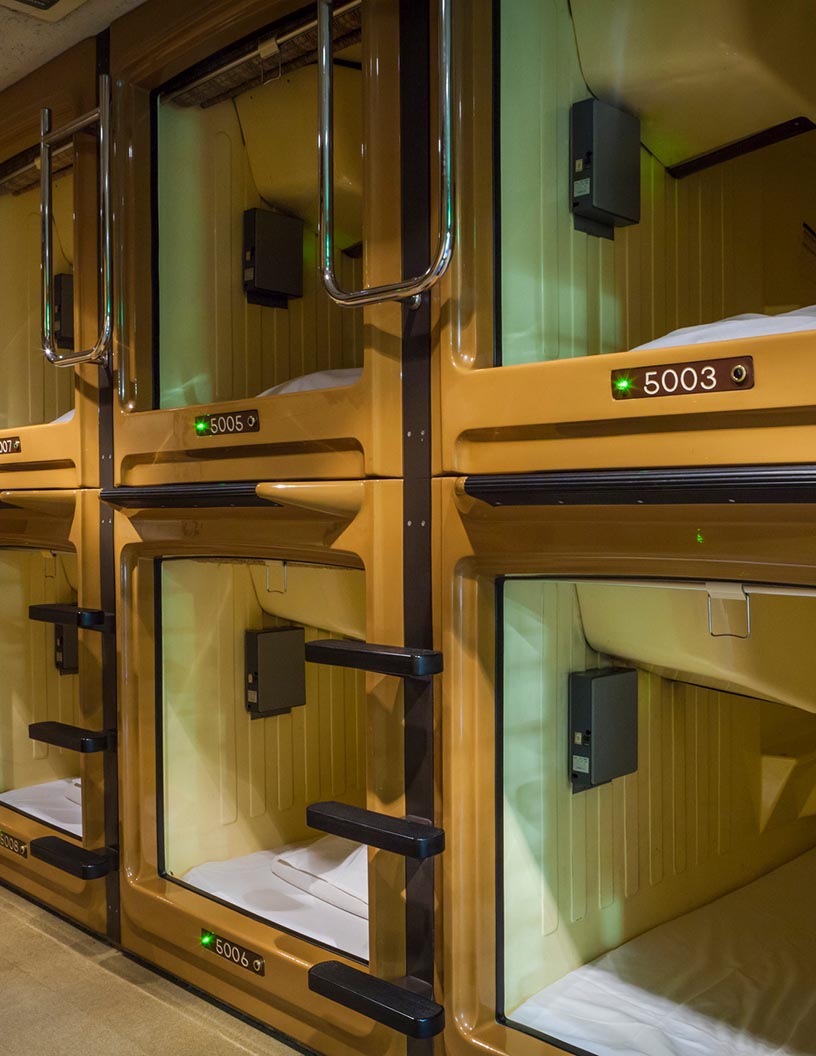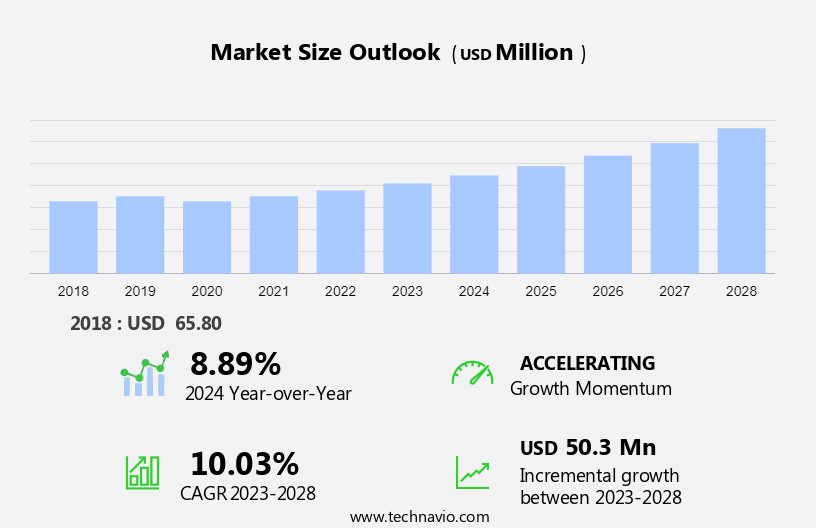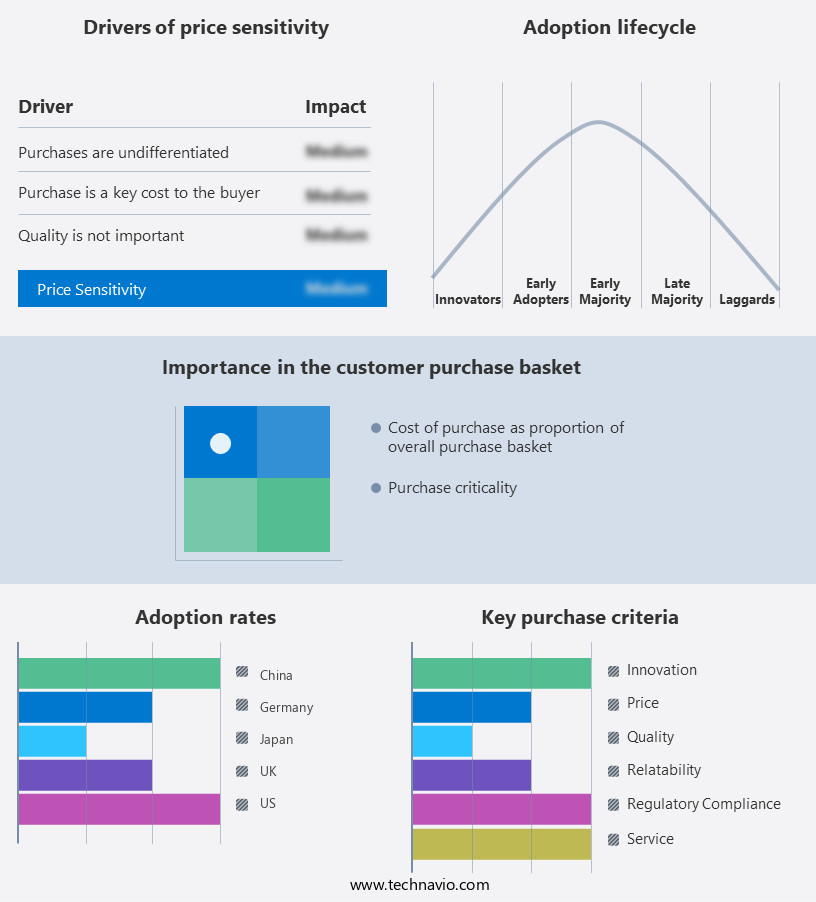Capsule Hotel Market Size 2024-2028
The capsule hotel market size is forecast to increase by USD 50.3 million at a CAGR of 10.03% between 2023 and 2028.
- The market is experiencing significant growth due to several key factors. The increasing disposable income of travelers, particularly in Asia Pacific, is driving demand for affordable yet comfortable lodging options. Moreover, the expansion of the global travel and tourism industry is fueling the growth of this market. However, the negative impacts of the pandemic on the hospitality industry have presented challenges, leading to temporary closures and reduced occupancy rates. However, concerns like claustrophobia and large luggage may pose challenges to the market. Despite these hurdles, the market is expected to recover and continue its growth trajectory as travel restrictions ease and consumer confidence returns. The capsule hotel concept offers a unique and cost-effective solution for budget-conscious travelers, making it an attractive investment opportunity for industry players.
What will be the Size of the Capsule Hotel Market During the Forecast Period?
- The market, also known as pod hotels or sleeping cabins, offers cost-effective lodging solutions for solo travelers and office workers. These vertical or horizontal structures provide compact, individual living spaces equipped with essential amenities such as a pillow, locker facility, alarm clock, and charging socket. Common washroom facilities are shared among guests, ensuring efficiency and affordability. The market caters to both tourists and local residents, particularly those in need of hourly accommodations near train stations or tourist areas. The trend toward simple, minimalist accommodations has gained popularity among Generation Y and international travelers seeking unique experiences. Capsule hotels come in various designs, including wooden and metallic structures, and can be found in numerous locations worldwide. The market continues to grow, driven by increasing demand for affordable lodging options In the tourism sector.
How is this Capsule Hotel Industry segmented and which is the largest segment?
The industry research report provides comprehensive data (region-wise segment analysis), with forecasts and estimates in "USD million" for the period 2024-2028, as well as historical data from 2018-2022 for the following segments.
- Mode Of Booking
- Offline booking
- Online booking
- Geography
- APAC
- China
- Japan
- North America
- US
- Europe
- Germany
- UK
- South America
- Middle East and Africa
- APAC
By Mode Of Booking Insights
- The offline booking segment is estimated to witness significant growth during the forecast period.
Capsule hotels offer hourly basis accommodation for solo travelers and groups, providing a cost-effective lodging solution for budget-conscious tourists and office workers. These vertical and horizontal structures come in both wooden and metallic designs, catering to the preferences of Generation Y travelers. Operators in the lodging industry have capitalized on the demand for flexible booking options, keyless entry systems, and smartphone apps, allowing travelers to easily reserve hourly rates for shared bathroom facilities.
Capsule hotels are particularly popular among tourists facing flight delays or long layovers, as well as students on international trips. The compact design of these simple accommodations allows for efficient use of real estate, making them an attractive option for the tourism sector. However, some travelers may find the claustrophobic nature of these small spaces a deterrent. Despite this, the budget accommodation segment continues to thrive, with operators offering hourly accommodations near train stations and other transportation hubs to cater to the needs of the traveling public.

Get a glance at the Capsule Hotel Industry report of share of various segments Request Free Sample
The Offline booking segment was valued at USD 49.70 million in 2018 and showed a gradual increase during the forecast period.
Regional Analysis
- APAC is estimated to contribute 41% to the growth of the global market during the forecast period.
Technavio's analysts have elaborately explained the regional trends and drivers that shape the market during the forecast period.
For more insights on the market share of various regions, Request Free Sample
The Asia Pacific (APAC) region dominates the market, driven by the rising disposable income of the middle class and the growing preference for affordable accommodations among millennials. The region's economic growth, particularly in countries like Japan, China, and India, has led to an increase in the number of budget-conscious travelers, including backpackers, solo adventurers, and business travelers. These travelers seek cost-effective lodging solutions, such as capsule hotels, which offer compact, personalized experiences in urban areas. Key features of capsule hotels, such as locker facilities, alarm clocks, charging sockets, and common washrooms, cater to the needs of these travelers. The offline and online booking segments cater to various modes of booking, including travel agents, airports, railway stations, and Wi-Fi connectivity. The market is expected to grow significantly due to the increasing popularity of capsule hotels among budget travelers, solo travelers, and tourists, as well as the integration of technology, such as AI, IoT, metasearch engines, and big data analytics, to enhance the customer experience.
Market Dynamics
Our researchers analyzed the data with 2023 as the base year, along with the key drivers, trends, and challenges. A holistic analysis of drivers will help companies refine their marketing strategies to gain a competitive advantage.
What are the key market drivers leading to the rise in the adoption of Capsule Hotel Industry?
Growing disposable income of travelers is the key driver of the market.
- The market is experiencing significant growth, particularly in developing economies like India, China, and Brazil. Fueled by the expanding middle class and rising disposable income, budget-conscious travelers, including millennials and Generation Z, are seeking cost-effective lodging solutions. These travelers prefer compact, hourly-basis accommodations in urban areas, such as pod hotels or sleeping cabins, which offer flexible booking options and common washroom facilities. Key amenities like alarm clocks, charging sockets, and Wi-Fi connectivity cater to the needs of business travelers and solo adventurers. Offline booking segments cater to those who prefer traditional methods, while web-based booking, AI, IoT, and metasearch engines cater to tech-savvy travelers.
- The market is further segmented into solo and group travelers, with solo travelers accounting for a larger share. The market is influenced by various factors, including domestic issues, local tourism industry growth, and international trips. Operators offer various flexible accommodations, such as shared bathrooms and keyless entry systems, to cater to the needs of budget travelers, backpackers, and office workers. The market is also influenced by trends like personalized experiences, luxury hotels, lodges, and vertical or horizontal designs. The market is expected to grow steadily due to the increasing demand for simple accommodations and the convenience they offer. Factors like hourly rates, flight delays, long layovers, and compact design cater to the needs of travelers, especially in metropolitan areas. Overall, the market presents an opportunity for hoteliers and real estate investors to cater to the diverse needs of travelers while maintaining a competitive edge.
What are the market trends shaping the Capsule Hotel Industry?
The growth of the global travel and tourism industry is an upcoming market trend.
- In recent years, the market, also known as pod hotels or sleeping cabins, has gained popularity as a cost-effective and flexible accommodation solution for various travel segments. These compact, vertical or horizontal structures offer individual capsules equipped with essential amenities such as a pillow, locker facility, alarm clock, and charging socket. Common washrooms and shared facilities like breakfast facilities and Wi-Fi connectivity cater to the needs of budget-conscious travelers, backpackers, solo adventurers, business travelers, and solo travelers. The offline booking segment, particularly in urban areas, continues to thrive, while web-based booking and AI, IoT, and metasearch engines have become increasingly prevalent.
- The Gen Y and Gen Z segments, including millennials and Gen Z, have shown a strong preference for these capsule hotels due to their personalized experiences and affordable prices. Budget travelers, office workers, students, and solo travelers are the primary consumers of this accommodation type. The real estate market and hoteliers have responded by investing in keyless entry systems, smartphone apps, and flexible booking options. Hourly rates, flight delays, and long layovers are common booking modes for these travelers, with train stations and airports serving as popular locations. The market caters to various demographics, including male and female travelers, and offers a range of designs, from wooden to metallic.
What challenges does the Capsule Hotel Industry face during its growth?
Negative impacts of a pandemic is a key challenge affecting the industry growth.
- The market, also known as pod hotels or sleeping cabins, offers budget-conscious travelers, backpackers, solo adventurers, business travelers, and millennials/Gen Z a cost-effective lodging solution in urban areas. These compact accommodations provide locker facilities, alarm clocks, charging sockets, and common washrooms. Offline booking segment and web-based booking are popular modes for this market, with travel agents, airports, and railway stations being common booking points. The market caters to various segments, including solo travelers, group travelers, and budget travelers. The vertical and horizontal designs come in wooden and metallic structures, catering to different preferences. The market is driven by factors like domestic issues, WiFi connectivity, breakfast facilities, hourly basis accommodation, and flexibility in accommodations.
- The market has seen an increase in demand from solo travelers, tourists, office workers, students, and budget-conscious travelers. The market is also influenced by factors like flight delays, long layovers, and catastrophes leading to an increase in demand for hourly accommodations near airports and train stations. The market is expected to grow with the increasing trend of personalized experiences, flexible accommodations, and the growing popularity of solo travel destinations. The market is also expected to benefit from advancements in technology, including AI, IoT, metasearch engines, big data analytics, keyless entry systems, and smartphone apps, offering flexible booking options and hourly rates.
Exclusive Customer Landscape
The market forecasting report includes the adoption lifecycle of the market, market growth and forecasting, covering from the innovator's stage to the laggard's stage. It focuses on adoption rates in different regions based on penetration. Furthermore, the market report also includes key purchase criteria and drivers of price sensitivity to help companies evaluate and develop their market growth analysis strategies.
Customer Landscape
Key Companies & Market Insights
Companies are implementing various strategies, such as strategic alliances, market forecast, partnerships, mergers and acquisitions, geographical expansion, and product/service launches, to enhance their presence in the industry.
The industry research and growth report includes detailed analyses of the competitive landscape of the market and information about key companies, including:
- Book and Bed Tokyo
- Container Hotel Group
- De Bedstee Capsules Hotel B.V.
- Dream Lodge
- First Cabin HD Co. Ltd.
- Hostels Hub Point S.L.
- Inbox Capsule Hotel
- Koyasan guesthouse Kokuu
- Nadeshiko Hotel
- Nonze Hostel
- Pangea Pod Hotel
- RB Hospitality Pte Ltd.
- Riccarton Capsule Hotel
- TAKE Hostel Conil
- The Bed KLCC
- The Capsule Hotel
- The Pod Sydney
- Time Capsule Retreat
- Tubohotel
- Urban Pod Pvt. Ltd.
Qualitative and quantitative analysis of companies has been conducted to help clients understand the wider business environment as well as the strengths and weaknesses of key industry players. Data is qualitatively analyzed to categorize companies as pure play, category-focused, industry-focused, and diversified; it is quantitatively analyzed to categorize companies as dominant, leading, strong, tentative, and weak.
Research Analyst Overview
The market represents a unique and innovative solution for budget-conscious travelers seeking affordable and flexible accommodations. These establishments offer compact, individual units designed for a single occupant, often featuring essential amenities such as lockers, alarm clocks, charging sockets, and common washroom facilities. The offline booking segment continues to coexist with the web-based booking trend, catering to the preferences of various traveler demographics. Generation Y and solo travelers, in particular, have shown a strong affinity for this type of accommodation due to its cost-effectiveness and convenience. Domestic issues, such as urbanization and increasing living costs, have contributed to the growing popularity of capsule hotels in numerous countries. The compact design allows for efficient use of space in densely populated areas, making them an attractive option for both tourists and office workers. The integration of technology in capsule hotels has been a significant market driver. Keyless entry systems, smartphone apps, and flexible booking options have enhanced the overall guest experience, providing personalized solutions for travelers.
Moreover, IoT and AI technologies have enabled capsule hotels to offer advanced features like wifi connectivity, hourly basis accommodation, and real-time data analytics. The budget traveler segment, which includes backpackers, solo adventurers, and students, has been a primary target demographic for capsule hotels. These travelers often prioritize affordability and flexibility, making capsule hotels an ideal choice for their accommodation needs. However, concerns regarding claustrophobia and limited space for large luggage have been raised. Operators have addressed these issues by offering various solutions, such as vertical and horizontal designs, wooden and metallic finishes, and hourly rates to accommodate travelers with different needs. The market has experienced significant growth in various sectors, including tourism, transportation hubs like airports and railway stations, and solo travel destinations. The trend is expected to continue, as more travelers seek cost-effective and flexible lodging options.
Furthermore, the market dynamics are influenced by factors like booking mode, demographics, and travel patterns. Generation X, millennials, and Gen Z have shown a strong preference for solo travel, while group travelers seek shared facilities and experiences. The travel industry has also been impacted by the rise of capsule hotels, with traditional hoteliers and lodges adapting to the changing landscape. The competition between online and offline booking modes, travel agents, and metasearch engines has intensified, leading to increased innovation and personalized offerings.
|
Market Scope |
|
|
Report Coverage |
Details |
|
Page number |
129 |
|
Base year |
2023 |
|
Historic period |
2018-2022 |
|
Forecast period |
2024-2028 |
|
Growth momentum & CAGR |
Accelerate at a CAGR of 10.03% |
|
Market growth 2024-2028 |
USD 50.3 million |
|
Market structure |
Fragmented |
|
YoY growth 2023-2024(%) |
8.89 |
|
Key countries |
China, US, Germany, Japan, and UK |
|
Competitive landscape |
Leading Companies, Market Positioning of Companies, Competitive Strategies, and Industry Risks |
What are the Key Data Covered in this Capsule Hotel Market Research and Growth Report?
- CAGR of the Capsule Hotel industry during the forecast period
- Detailed information on factors that will drive the market growth and forecasting between 2024 and 2028
- Precise estimation of the size of the market and its contribution of the industry in focus to the parent market
- Accurate predictions about upcoming growth and trends and changes in consumer behaviour
- Growth of the market across APAC, North America, Europe, South America, and Middle East and Africa
- Thorough analysis of the market's competitive landscape and detailed information about companies
- Comprehensive analysis of factors that will challenge the capsule hotel market growth of industry companies
We can help! Our analysts can customize this capsule hotel market research report to meet your requirements.



